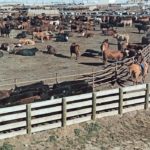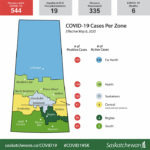Saskatchewan will contribute its 40 percent share of the AgriRecovery program announced earlier this month for beef and pork producers. Agriculture minister David Marit said May 14 the province would pay $5 million to fund the set-aside program. That gives livestock producers access to a total of 12.5 million. Ottawa announced its 60 percent on […] Read more
Tag Archives COVID-19 virus

Food companies offered COVID-19 support
Food companies, including agribusinesses, will be able to apply for relief money from a new $100 million federal fund. The Agriculture and Food Business Solutions Fund will be run by Farm Credit Canada. “This is yet another option to help agrifood companies facing unexpected financial strain,” Prime Minister Justin Trudeau said today during his daily […] Read more

Cattle producers support food banks
Saskatchewan’s two main beef organizations are working together to fight hunger. The Saskatchewan Stock Growers Association began its Beef Drive for food banks in 2016, and this week the Saskatchewan Cattlemen’s Association donated $10,000 to the cause. The project has seen nearly 30,000 pounds of beef, plus thousands of dollars, donated to Food Banks of […] Read more

Small slaughter plants not the answer: Unrau
About 15 years ago, Martin Unrau assumed that small slaughter plants made sense. If Western Canada had a number of beef processing plants scattered across the Prairies, they could benefit cattle producers and the beef industry. Then he became president of the Manitoba Cattle Producers Association and the Canadian Cattlemen’s Association, and that completely changed […] Read more

Calls continue for Cargill beef plant closure
Alberta’s NDP opposition continues to call for the closure of the Cargill meat processing plant in High River, Alta., saying it has failed to keep its workers safe from infection by COVID-19. Labour critic Christina Gray said Cargill must close until it meets legal requirements to engage workers on safety. She provided a copy of […] Read more

Bison market crashes down on producers
Only a couple of months ago, the price of a bison carcass was close to $5 a pound in Western Canada. Now, prices on the rail have dropped to $3.50 per lb. But that number isn’t precise because the packing plants are processing very few animals. “There’s no liquidity right now,” said Dean Andres, who […] Read more

Ag committee meets online, opposition critiques federal COVID response
Opposition MPs used the first meeting of the standing committee on agriculture and agri-food since the pandemic began May 5 to critique the federal Liberal’s $252 million aid package for farmers and food processors. Conservative MP Richard Lehoux charged the $100 million made available to help livestock producers deal with processing delays was not enough […] Read more

Researchers predict agri-food technology to grow post-COVID-19
A researcher at the University of Guelph says the COVID-19 pandemic will spark agility — particularly related to technology — in agriculture. “(The pandemic) has re-emphasized the need to get access to some of the technology that exists in other sectors and are not easily accessible in agri-food systems,” said Rozita Dara, an associate professor […] Read more

COVID-19 remains quiet in southern Sask.
While cases of COVID-19 continue to rise and cause concern in northern Saskatchewan, all appears quiet in the rural south. As of May 8, cases in the central region remained at 11, while the south had recorded 15. Neither zone has had an active or new case since the end of April. Regina had only […] Read more

Packer backlog to remain problem for months
The rate of cattle processing at Western Canada’s two largest processing plants is slowly increasing but a backlog of slaughter-ready cattle is expected to pose a problem for months. The Cargill plant at High River, Alta., is now running at about 50 percent of its 4,500-5,000 head daily capacity and JBS in Brooks is processing […] Read more






